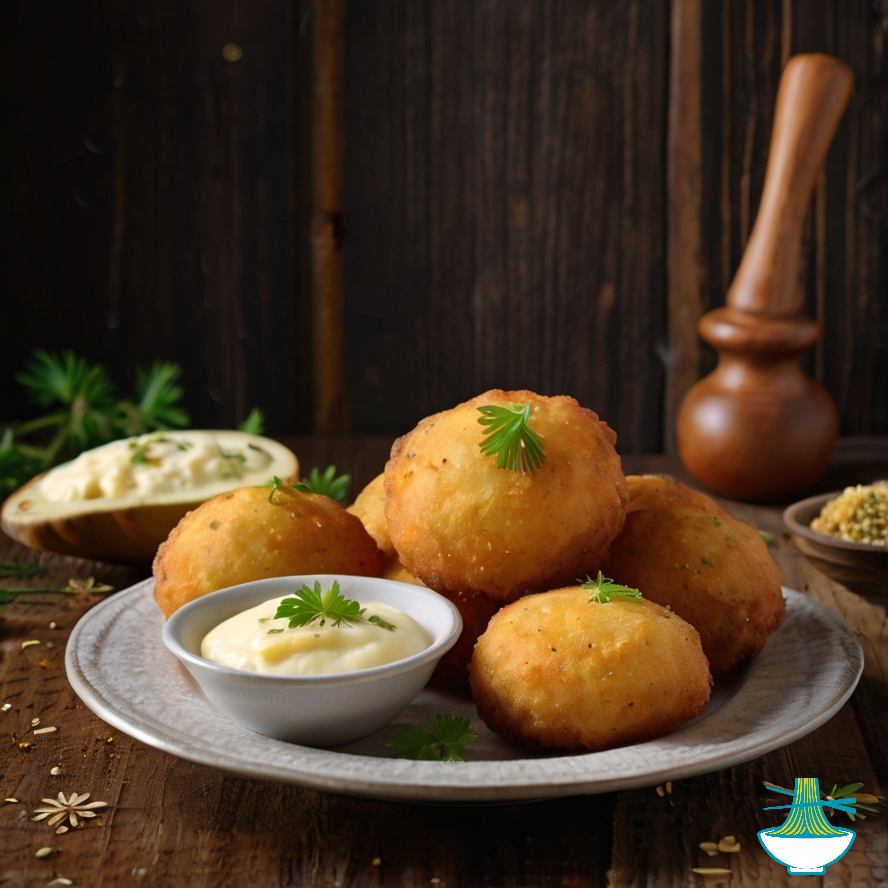Mandocas or Sweet Corn Fritters are traditional Venezuelan fritters made from cornmeal, flavored with anise seeds,giving them a distinctive and aromatic taste.
These fritters are typically deep-fried until golden brown, creating a crispy exterior while maintaining a soft and fluffy texture inside. They are often served as a snack or breakfast item and are sometimes accompanied by cheese for added flavor and richness.
The history of mandocas traces back to indigenous culinary traditions in Venezuela, where corn has long been a staple ingredient. Over time, variations of this recipe emerged, incorporating different spices and ingredients to suit local tastes. Today, mandocas remain a popular and beloved dish in Venezuelan cuisine, showcasing the country's rich culinary heritage and the versatility of corn-based recipes.
Ingredients:
- 2 cups cornmeal
- 1 tablespoon anise seeds
- 1 teaspoon salt
- 1 1/2 cups warm water
- Vegetable oil for frying
- Cheese (optional, for serving)

Method of Preparation:
1. In a mixing bowl, combine the cornmeal, anise seeds, and salt.
2. Gradually add the warm water to the dry ingredients, mixing until you form a dough that holds together.
3. Divide the dough into small portions and shape them into flattened rounds or patties.
4. Heat vegetable oil in a deep pan or fryer to 350°F (175°C).
5. Carefully place the mandocas in the hot oil and fry until golden brown and crispy, about 3-4 minutes per side.
6. Remove the mandocas from the oil and drain them on paper towels to remove excess oil.
7. Serve the mandocas hot, optionally with cheese on top or on the side for dipping.
This recipe emphasizes simplicity and clarity, making it easy to follow for anyone looking to make delicious mandocas at home.
Nutrition Value:
1. 2 cups cornmeal
- Calories: Approximately 800 kcal
- Carbohydrates: About 168 grams
- Protein: Around 20 grams
- Fat: Less than 5 grams
- Sodium: Varies based on brand, typically low
- Cholesterol: None
- Vitamins and minerals: Rich in vitamin A, B vitamins (especially niacin and folate), iron, magnesium, and phosphorus
- Nutritional benefits: Cornmeal provides energy from carbohydrates, essential vitamins and minerals for metabolism, and dietary fiber for digestive health.
2. 1 tablespoon anise seeds
- Calories: About 23 kcal
- Carbohydrates: About 4 grams
- Protein: About 1 gram
- Fat: About 1 gram
- Sodium: Varies based on preparation, usually negligible
- Cholesterol: None
- Vitamins and minerals: Contains small amounts of calcium, iron, magnesium, and manganese
- Nutritional benefits: Anise seeds add flavor and may have digestive benefits, including reducing bloating and aiding in digestion.
3. 1 teaspoon salt
- Calories: Negligible (about 0 kcal)
- Carbohydrates: None
- Protein: None
- Fat: None
- Sodium: Approximately 2,300 mg (daily limit for adults)
- Cholesterol: None
- Vitamins and minerals: None
- Nutritional benefits: Salt enhances flavor but should be used in moderation due to its high sodium content.
4. 1 1/2 cups warm water
- Calories: Negligible (about 0 kcal)
- Carbohydrates: None
- Protein: None
- Fat: None
- Sodium: None
- Cholesterol: None
- Vitamins and minerals: None
- Nutritional benefits: Provides hydration but no significant nutrients.
5. Vegetable oil for frying
- Calories: Approximately 120 kcal per tablespoon (varies based on type and amount used)
- Carbohydrates: None
- Protein: None
- Fat: About 14 grams per tablespoon
- Sodium: None
- Cholesterol: None
- Vitamins and minerals: Contains vitamin E and small amounts of vitamin K
- Nutritional benefits: Provides fats for energy and may contain vitamin E, an antioxidant.
6. Cheese (optional, for serving)
- Calories: Varies depending on type and amount
- Carbohydrates: Varies
- Protein: Varies
- Fat: Varies
- Sodium: Varies
- Cholesterol: Varies
- Vitamins and minerals: Contains calcium, phosphorus, vitamin A, vitamin B12, and other nutrients based on type
- Nutritional benefits: Cheese adds flavor, protein, and calcium, but should be consumed in moderation due to its saturated fat and sodium content.
These ingredients together can be used to make various dishes like arepas or other fried cornmeal-based preparations.


Comments